#he's an acclaimed researcher & also a professor
Text
what if,,, i had a modern/university au?
#ok hear me out#macbeth is adopted by his foster father#lets call the foster father 'brian' bc. the alternative is silly#close enough anyway#brian is 10/10 snooty academic. a lil bit nasty#just a lil bit (maybe A Lot)#he's an acclaimed researcher & also a professor#(brian has no business working w children btw)#(he's like my calc prof. every1 hates him. no chilll)#ik this sounds like a modern au for brain not midnight#im getting there ok#anyway being a professor's son means ✨free college✨#midnight is a physics student idk#i think he Wants to be an art student buuutt#father said no#maybe he has a youtube channel or smthn#☽ \ ( out of character ) .#tbd.
2 notes
·
View notes
Note
Can I ask where the dialogue about gale previously being a professor pre game events is
hello, anon! thank you for the question. the short answer is: there is none!
the longer answer is that as far as we know, he wasn't a professor before the events of the game, but only becomes one in one of his epilogue endings.
we do know gale is a wizard of acclaim and scholar of exceptional accomplishment:
Gale: Let's see. I hail from Waterdeep, the City of Splendours. I'm a wizard of considerable acclaim, and scholar of exceptional accomplishment. I have a cat, a library, and a weakness for a good glass of wine. And if the mood takes me, I'm known to try my hand at poetry. There.
it could mean a number of things of course, we don't exactly know because gale doesn't say what that entails for him, but he likely published works on his research subjects and it's also likely he's worked on spells with tara together since we do know that she invented the 'cat flap of displacement'.
we do also know that gale had pupils prior to the game, but not as a professor:

Player: Do you have much experience being a teacher of magic? I suspect so.
Gale: I've had a pupil or two, but never for very long. Their ineptitudes tend to... irk me.
Gale: You do seem to be a precocious talent though. I can always tell when I meet with a keen mind receptive to Mystra.
Gale: Keep it up and she might just take a personal interest in you one of these days.
again, we know he wasn't a professor or he would've certainly mentioned it in his introduction, as well as it not being such a big part of his epilogue ending, showing his growth and making peace with himself. the way his files frame him becoming a professor also speak against him being so before the game:

This dialogue covers instances where Gale attends the Withers party in a human (non-god) form.
His default state is that he returned to Waterdeep and became a professor of Illusory magic at his former school, Blackstaff Academy. General vibe here is that this is a Gale who's found peace with himself - he's a great teacher, one his students are mostly in awe of.
i think it's more likely he either tutored - as that is a very common practise in waterdeep, and even available to the lower classes:



or gale took on a wizard apprentice independently, which... i can sort of see happening. although, it seems he wasn't ready at that point. we can only speculate as to why. perhaps these pupils couldn't keep up with gale, who we do know has a brilliant mind that's always moving, perhaps he wasn't ready yet to take on such a great responsibility while romanticising the idea itself.
what we do know is that he likes sharing knowledge, he wants to impart wisdoms and teachings. not only do we notice that along the journey with gale as a companion, but it's also explicitly a wish revealed by the love test with zethino the dryad:

Zethino: Gale: the learned wizard. The charming gentleman. The walking apocalypse.
Zethino: Listen. Think. If the wizard were given the choice, what food would he be?
Player: A shiny red apple - wholesome as can be.
Gale: Ah, the fruit of scholars. How I long to have a troop of loyal students grace me with apples by the orchard-full in exchange for wisdoms imparted...
devnote: Pleased, briefly daydreaming
and that he does grow into his own in the epilogue, through his travels and experiences.
he becomes a great professor, whose students hold him in high regard and whose passion for the position is evident in everything he says during the epilogue.
anyhow, i hope that was helpful! 🖤
#gale dekarios#gale of waterdeep#baldur's gate 3#bg3#baldurs gate 3#ch: gale dekarios#vg: baldur's gate 3#series: baldur's gate#meta: mybg3#text: asks
89 notes
·
View notes
Text


"Vice-Chancellor,
Formula 1 Grand Prix racing is regarded as the pinnacle of motorsport and, even if we are not die-hard aficionados, most of us are familiar with the names of recent world champions. Less familiar, however, are the names of the men and women who provide the expertise and infrastructure essential to the performance of those champions and their cars. Today we celebrate one of the most successful and distinguished of that supporting cast: Andrew Shovlin, the Chief Race Engineer for the highly successful Mercedes AMG Petronas F1 team.
Andrew arrived in Leeds to start his undergraduate course in Mechanical Engineering in 1992. His final-year project on the mathematical modelling of car suspension systems directly led to a PhD project, under the supervision of the late Professor Dave Crolla, on the dynamics of military logistics vehicles. As a member of Dave’s renowned Vehicle Dynamics research group, Andrew presented his work at several international conferences, at one of which he was awarded the prestigious Institution of Mechanical Engineers Viscount Weir prize.
As well as chasing Challenger Tanks around the North York moors as part of his PhD project, Andrew also found time to become involved with our early Formula Student race car activities: he travelled with the team to the US when, in 1997, we became the first UK university to enter the Formula SAE event.
After receiving his PhD in 1998, Andrew joined British American Racing, the start of his highly successful career in Formula 1. He went on to became Jenson Button’s race engineer – the person responsible for crucial decisions about car setup and race strategy before and during a race – and was much acclaimed when Jenson won the world championship with Brawn in 2009. Andrew became Michael Schumacher’s race engineer the following year, when Mercedes took over Brawn; and was then promoted in 2011 to be chief race engineer for Mercedes. In that role, he has helped secure three successive world titles, for Lewis Hamilton and Nico Rosberg, as the team has come to dominate the sport.
Despite his busy and demanding career in motorsport, Andrew has not forgotten his alma mater, and has returned frequently to give talks to our students and to offer advice to our current Formula Student team. And it is perhaps no coincidence that in recent years we have had at least one of our students undertaking a much sought after year-long work placement at Mercedes F1.
Through his outstanding success in the demanding world of Formula 1 racing, Andrew is a great ambassador for automotive engineering at Leeds, and a true inspiration to our students.
Vice-Chancellor, I present to you for the degree of Doctor of Science (Engineering) honoris causa, Andrew Francis Shovlin."
[x]
25 notes
·
View notes
Text
ON OCTOBER 27TH, after roughly three weeks of campus turmoil surrounding student responses to Hamas’s October 7th attacks and the ensuing Israeli bombardment of Gaza, Harvard president Claudine Gay announced at a Shabbat dinner at Harvard Hillel that she was establishing an advisory group to guide her efforts to combat antisemitism on campus. In a November 9th email, she unveiled its members, a collection of Harvard administrators, alumni, professors, and affiliated rabbis. Her message to the campus community laid out some of the group’s initial plans, including “a robust program of education and training for students, faculty and staff on antisemitism broadly and at Harvard specifically.” The email also offered a clue as to the task force’s orientation: Gay noted that the training would address “the roots of certain rhetoric that has been heard on our campus in recent weeks.” It specifically condemned the phrase “from the river to the sea,” a pro-Palestine slogan that she said conveys “specific historical meanings that to a great many people imply the eradication of Jews from Israel and engender both pain and existential fears within our Jewish community.”
But while Gay’s letter suggests that the task force will explore what she casts as a worrisome relationship between antisemitism and activism for Palestinian rights, none of its members have conducted scholarly research into this supposed intersection. Most notably absent from the advisory group was Derek Penslar, the director of Harvard’s Center for Jewish Studies and a leading scholar of Zionism and its critics. His acclaimed recent book, Zionism: An Emotional State, includes a chapter entitled “Hating Zionism,” on the different motivations that have driven Zionism’s opponents since its creation. Given the relevance of his scholarship, Penslar would have seemed an obvious choice for the advisory group. But according to four faculty members familiar with Jewish studies at Harvard who requested anonymity to discuss internal university affairs, not only was he not selected, he wasn’t even consulted. One professor compared snubbing Penslar to “creating a task force on AI without consulting the chair of the department of computer science.”
Why wasn’t Penslar chosen? One likely factor is that he signed the Jerusalem Declaration on Antisemitism (JDA), which states that “criticizing or opposing Zionism” is not necessarily antisemitic. By contrast, most of the people appointed to the advisory group—none of whom have Penslar’s expertise—have made public statements alleging that anti-Zionism is antisemitic, or are affiliated with organizations that hold that view. Though Gay’s email claims that the advisory group is committed to “bringing our teaching and research mission” to bear in the fight against antisemitism, the group’s composition suggests that its members were selected less for their scholarly credentials than for their political beliefs, which align with those of influential donors, some of whom have already withdrawn funding or have threatened to do so.
—Harvard Is Ignoring Its Own Antisemitism Experts
#politics#palestine#israel#claudine gay#derek penslar#harvard#gaza#education#antisemitism#anti zionisim#antizionism ≠ antisemitism#anti zionism ≠ antisemitism#october 7#october 7th#bds#boycott divest sanction#genocide#never again#never again to anyone
56 notes
·
View notes
Text
Jasper William Morgan (born 12 June 1970) is a British-American hotelier, businessman, and former actor. He is best known for his portrayals of Liam in the 1997 film Dark Skies, of Sebastian Harewood in the 1995 television miniseries The Outcast, and of Daniel Austin in the critically acclaimed 2009 detective noir film A Conflict of Shadows, for which he earned an Academy Award. He also received a Tony for his role in The Lights of Love (2003).
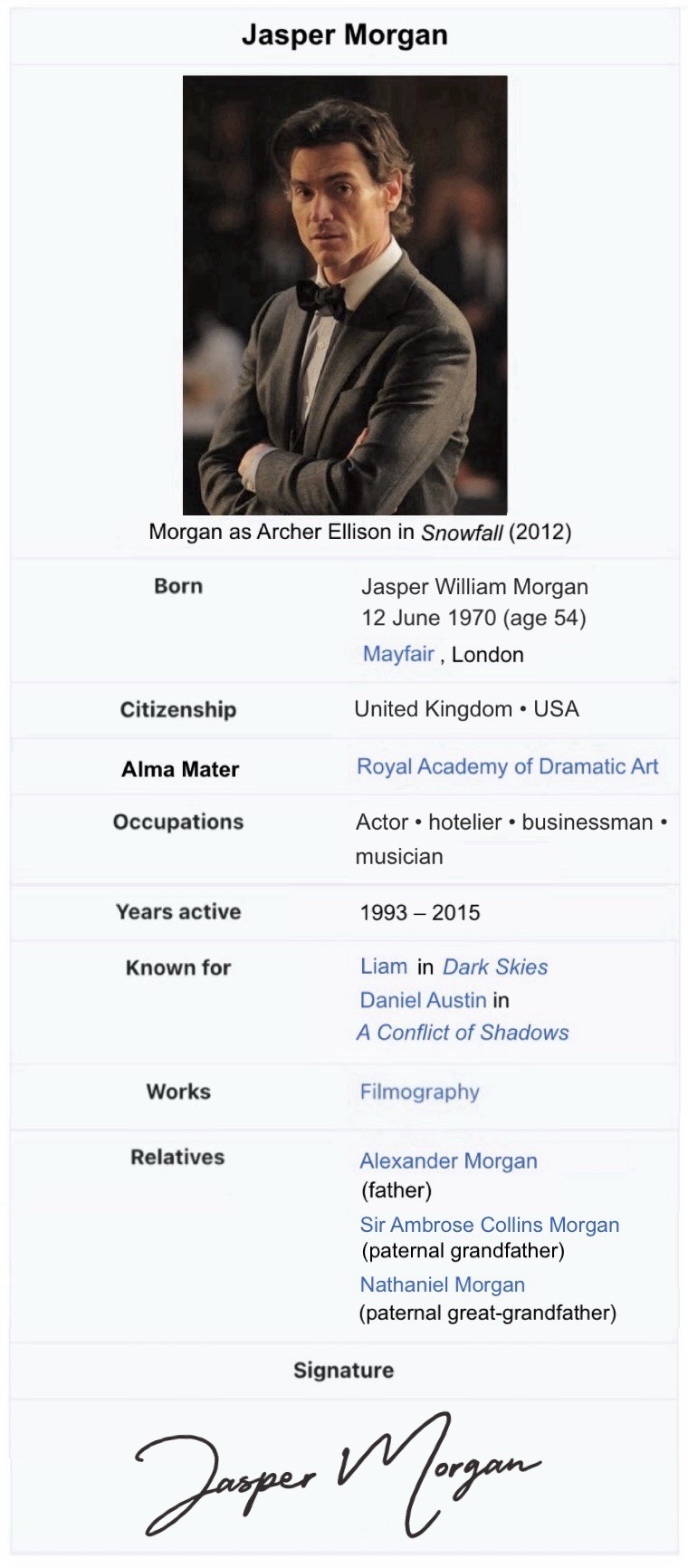
▲ Early Life and Family
Morgan was born in Mayfair, London to parents Alexander Morgan, the UK's financial secretary to the treasury, and Jillian Morgan (née Spencer), who was the Dean of the University of Central London. He is an only child.
Morgan's paternal grandfather, Sir Ambrose Collins Morgan, was a decorated Royal Navy Admiral, and his great-grandfather, Professor Nathaniel Morgan, was an acclaimed neurosurgeon and neurosurgery researcher who taught at Oxford University. His maternal grandfather, Phillip Spencer, was an investment banker and his wife, Augusta Spencer (née Clairmont), was an oil painter and sculptor.
He spent the majority of his childhood in the care of his maternal grandparents and it was his grandfather, who Morgan cites as being a major influence in pursuing acting as a career as they often watched classics together. His favourite films growing up were The General (1926), Casablanca (1942), and One Hundred and One Dalmatians (1961), and To Kill a Mockingbird (1962). His parents wanted him to follow their footsteps into government or education or even to become a doctor, but Morgan was always adamant about wanting to be an actor. Eventually he was allowed to enrol in a local drama club where he built up his confidence and started to gain some experience in amateur dramatics.
His education was spent in private London schools, which Morgan doesn't credit as having any significant impact on him at all. He has said that there was always more of a focus on mathematics, science, and competitive sports rather than any of the arts and often felt very much an outsider from the rest of his classmates. However, he managed to encourage his secondary school headmaster to put on a rendition of Macbeth for pupils and parents, which was met with praise.
At the age of 18, Morgan attended the Royal Academy of Dramatic Art. His parents helped to pay for the majority of his tuition, but only agreed to do so if Morgan got himself a part-time job to pay for the rest. He ended up at the at the Mornington Hotel near Regent's Park where he first worked the reception nightshift before transferring to waiting tables and later becoming the restaurant manager. He gave up the job once he signed on to The Outcast.
▲ Career
After appearing as an extra in several British television shows throughout 1993, Morgan portrayed Sam Woodbury in the short-lived London West End play One More Night, and then as the younger version of Eric Radcliffe Reid’s character Wilson in the short film Whirlwind, Morgan landed his breakthrough role in the 1995 miniseries The Outcast, playing the lead character Sebastian Harewood: a young upper class gentleman who is disowned by his wealthy father and is forced to make his own way in the world. The show’s director Kathryn Liu states that she ‘took a risk when casting Morgan, not knowing if an inexperienced actor would be able to handle a complicated filming schedule’, but later admitted that "he was perfect for the role and absolutely smashed it’ and ‘his inexperience as an actor even benefited him greatly in that his naivety transferred well into Sebastian’s own". Morgan and Liu later went on to work together on the 2013 action film Highwire.
Morgan was then quickly cast in the 1997 psychological thriller Dark Skies, which was filmed in his hometown of London. His role as the protagonist Liam, a recluse with a vendetta against the world who is also trying to maintain an equilibrium within the relationship he has with his overbearing girlfriend, gained him international recognition. Variety praised Morgan’s performance, writing: “it’s hard to tell that he has very little professional acting experience when watching him portray Liam. Morgan perfectly encapsulates his character’s life of hatred and from his very first moment on screen you’re simultaneously sympathetic and agitated, wanting him to improve his situation and yet also completely understanding why he is the way he is”. He was nominated for a BAFTA for this role and was the catalyst to his career.
When the filming of Dark Skies concluded, Morgan went to work in New York City after landing an off-Broadway role in Impolite Society (1998), which ran between 15 January and 12 March. Whilst his role was small, he was popular with audiences and it gave him the confidence to continue pursuing his career on the stage. Morgan told the American Theatre Magazine: "Theatre was always the most formidable area of acting for me. Doing a play at school was immensely different to doing one on a stage in front of almost 500 people in New York City. Whilst my first show in London played to more people than Impolite Society did, it felt far more daunting this time, strangely enough, and to be performing in front of an American audience was certainly surreal and incredibly special. I'd dreamed of that as a young boy and to have that dream come true is a huge ego boost". It was following this success that Morgan permanently moved to Manhattan.
Between 1999 and 2004, Morgan played Dr Reginald 'Reggie' Keller, a paediatrician and the younger brother of Dr Carolyn Keller (Erin Hardy) in the long-running medical drama series Heartlines, filming the majority of his later episodes in blocks so he could star in other projects (namely the 2002 film Unity and the 2003 theatre production The Lights of Love). During an interview for The Hollywood Reporter in 2012, Morgan said: "this period of my career was easily the most challenging I had done up to that point. Simultaneously acting in 27 episodes of a TV show and a film whilst also preparing to take on a Broadway role wasn't the smartest decision I had ever made, but it was one that allowed me to push myself to my limits and see what I could do under such immense pressure. My hard work certainly paid off; the honour of receiving a Tony award at the end of it all came as a wonderful surprise. However, I wouldn't recommend that kind of schedule for any actor, no matter their age or prowess."
In 2006, Morgan took on his only voice role in animated adventure Nightwalker, alongside Ricky Santos and Florence Martin-May, in which he played a crow named Merrick. He stated that he “wished to have taken on more voice acting in [his] career, but it was, unfortunately, never meant to be”. Directors Julia McGregor and Imaan Bashar had bronze statues made of the animal characters to give to their respective voice actors once filming commenced and Morgan is known to keep his in the office of his hotel.
Morgan spent most of 2007 on hiatus. He spent time out from acting in London as well as in Scotland, Tuscany, Munich, and Hawaii. During his time in London, he returned to his alma mater to give talks and acting classes to drama students; he was almost persuaded into becoming an acting coach, but turned it down to the fact he didn't believe he "had enough viable experience" at the time. It was in August 2007 that Morgan began to partake in philanthropic work, which he said he wished he could have began sooner, and was introduced to the Brave Youth Theatre Charity by friend and fellow actor Cecilia Crane, of which he is still a patron.
In 2008, he took a small role in the miniseries Small Mercies, appearing in three of the five episodes, in which he played Louis Graves, the father of the main character Serena Graves (Lily Richardson-Gill). Filming took place in Seattle, Washington, between April and September, with the show airing on New Years Day 2009. A second series had been proposed, but was ultimately scrapped.
His next appearance was in A Conflict of Shadows (2009), noted internationally for being his greatest performance. Morgan portrayed Daniel Austin- a corrupt police detective working for the NYPD in 1917- who slowly loses his sanity over the course of the film. On his role, Morgan commented: "Playing Daniel was like playing several different people. Each scene he was in was slightly different in terms of his speech and body language and to maintain those distinctions consistently was tough, but he was an incredibly entertaining character to play. I wouldn't pass up the opportunity to play him again if a sequel ever came into fruition." Audiences and critics raved about the film as a whole and of Morgan's performance, Edward Quartermain wrote: "he can express so much by one simple glance and it can be such a powerful gesture, especially to reflect the torment and gradual change in Daniel's internal world as he actively shuts out reality. The range that Morgan presents, from subtle finger switches to full-blown fiery rage, proves he is a formidable actor and one that will continue to both impress and surprise audiences around the world". The film eventually earned more than $1 billion worldwide and went on to win five Academy Awards (Best Picture, Best Director, Best Actor, Best Supporting Actress, and Best Costume Design) as well as numerous other awards (see here) and several other nominations (see here).
Morgan appeared in his fourth and final stage production, Heart of Steel, in 2011, in which he played Charlie Steel: a down-on-his-luck English man in New York City whose cold heart slowly starts to melt when he inadvertently befriends a lost, yet perpetually optimistic 12 year old boy named Ben (Samuel DeWitt). He was highly praised, with critic Laura Pryce saying: “his performance is captivating and deeply moving, a real intriguing insight into how a troubled man's life is a constant battle and can be suddenly transformed into a different kind of battle with something now worth fighting for. His chemistry with DeWitt is also exceptionally joyful to watch- a real bond was formed between both characters and actors”.
In 2012, Morgan starred as the lead in the critically acclaimed miniseries Snowfall. He played Archer Ellison- the mayor of a small Alaskan town that, blanketed by the perpetual darkness of winter, is being haunted by a supernatural force that brought despair and destruction to the residents. Talking to Variety, he said: "Snowfall was one of my more interesting and fun projects, even with the harsh filming conditions when on location. From the moment I read the script I knew I had to be a part of the show. The only disappointing thing for me was that it was only six episodes!" Morgan was also a producer for the show, the opportunity coming from the fact that original producers couldn't afford the full desired funding and Morgan offered to pay the remainder out of his own pocket. "They had a crystal clear vision for what they wanted out of the story," Morgan added, "and without the extra funding the show would have had to have been filmed on a soundstage in hot Los Angeles instead of in Alaska itself. The aesthetic of the setting is paramount to Snowfall; it wouldn't have had anywhere near the kind of chilling impact on audiences if they could clearly see the snow and backdrops were fake and digitally added in. Nobody can fully immerse themselves in a story when the details aren't all there. I was passionate about the story and knew that audiences would be just as enthusiastic as the creators were, so being able to help in adding to the budget was the least I could do. It was a high honour to be starring in the show, let alone being able to produce it".
In 2013, Morgan starred in Highwire, alongside Nina Fischer, who he previously worked with in Unity. The film was almost never made, however. Writers Dashiell McCormack and Kyle Draper wanted Kathryn Liu to direct after the first director, Jeri Schulz, dropped out last minute for personal reasons, but she initially turned down the opportunity. Despite the producers pushing to begin filming, McCormack and Draper refused to go ahead without Liu. It was Morgan, who was in the final stages of negotiations to star in the film and is a close friend of Liu's, that persuaded her to direct. After almost 8 months of filming, Highwire was released on became a success, both commercially and with audiences, earning more than $130 million worldwide, making it the biggest success of Liu's career. After the success of the opening weekend, Fischer claimed that Morgan had the rejection letter that Liu sent to McCormack and Draper framed and gifted it back to her. Liu herself later confirmed this and stated that along with the letter Morgan included a handwritten note that read: 'Dear Kat, I'm glad you took a chance on yourself and the film, like you did with me in 1995. Be brave and never doubt yourself. Love, J'.
Morgan’s final film role was in the 2015 fantasy epic Tyrant, in which he played the eponymous tyrannical ruler Lord Reynard. Filming began in early 2014 and was split between Scotland, Ireland, and Canada. He has cited that the film was his ‘most taxing’ and that ‘the villains are always the most entertaining to portray and wished I had the chance to take on that role more’. Tyrant's director Simon Leyland has often been cited to be difficult to work with due to his perfectionist directing style and long shooting periods and in an interview Morgan told The Hollywood Reporter that: "Even though Simon was determined to make a perfect fantasy film- and, in my opinion, he came rather close- the filming schedule and conditions were harsh and his criticisms only made things worse. I had a few squabbles with him on set, nothing more than minor creative differences that were eventually resolved, but sometimes had to play mediator between him and some of the crew members and actors. I was surprised I wasn't fired and replaced". He then went on to add: "Despite everything, the concept of the film was fun to play along with and being an unhinged ruler of a kingdom, shouting orders and laughing maniacally, was quite cathartic. It's an experience I'll never forget and I'm glad my acting career could end on a high". Morgan's performance also earned him a Critics’ Choice Award.
▲ Personal Life
Morgan is a trained pianist and has been playing for 45 years. It was his mother's idea to enlist him for lessons and did so from the age of 7. Morgan’s skills can be seen in the films Unity, A Conflict of Shadows, and Highwire. He has also played the piano at many charity galas, mainly focusing on charities that helped children and young adults with their literacy and that encouraged them to join in with the youth theatre. He was known for playing classical pieces as well as popular songs from film and television. Despite no longer attending these events, having stopped in 2016, just after he retired, Morgan still donates to the same charities.
Morgan is also talented in close-up magic, a skill that was introduced to him by RADA classmate Marcus Creaghan, and he would later perform these tricks for interviewers at award shows and at charity galas he attended. Morgan is also a self-professed impressionist, having learned by repeatedly watching specific film scenes and mimicking tone and inflections from a young age. He is known to do uncanny impressions of actors such as Al Pacino, Jeremy Irons, James Stewart, Liam Neeson, and Christopher Walken, amongst many others, having shown them off on the first season of The Tonight Show with Jimmy Fallon and The Graham Norton Show.
From January to July 1997, Morgan was in a relationship with actress Natalia Sinclair. Their relationship was initially private for the first two months as they began to film Dark Skies together, but soon became public after they were seen together outside of filming in Hyde Park. Although Morgan has always refused to talk about the subject, several reports were made that their time together was ‘heated, passionate at first’ but then ‘rapidly developed into something toxic’. He has also refused to comment on Sinclair's untimely death, too, only stating in an Instagram post in April 2024: “…I still respect her greatly, as a person and as an actor, and that she deserved better, both from her short life and from myself”.
After selling his home in London, he moved to an apartment in Manhattan, New York City, which he bought from an undisclosed NBL player in 1998 and stayed there until his retirement. It is a well known fact that Morgan loves parties and over the years, his apartment has been the setting of many personal social events and charity events, even hosting an array of celebrities, including Lillian Grace Bower, David Solis, and Ethel Ajibola.
In 2004, Morgan officially became an American citizen whilst also retaining his British nationality. He has stated that ‘even though I have lived in the United States longer than I have lived in London, I will always consider myself British first and foremost’.
He has never married, but dated English actress Hattie Radford-Lowell between 2001 and 2004, American actress and singer Twyla Blake between 2006 and 2010, and briefly dated American author Summer Aston during 2013. He also dated English actress Arabella Woods whilst they were both studying at the Royal Academy of Dramatic Art. He remains friends with Blake and is also close friends with A Conflict of Shadows director Colton Hensley, whose youngest son Morgan is godfather to.
Just weeks after the release of Morgan's final film, Tyrant, he hosted the 87th Academy Awards where he announced his retirement from acting. The announcement was met with a mixture of high praise of a prosperous career and disappointment from both fans and critics, many noting that they had been looking forward to seeing more of Morgan in theatre productions and speculating that he would even progress onto directing. In July 2015, he moved to Aurora Bay, California, where Of Fire and Stars was partly filmed and where he bought the Seascape Hotel from a local resident. He spent almost 2 years renovating and restoring it, with the funds coming from his own pocket, before reopening it as a luxury hotel that draws in guests from all over the world. Morgan still performs acting and music often on the stage of the hotel’s lounge & bar and takes a very active role in the day-to-day running of the Seascape.
▲ Filmography
► Film
• Whirlwind (1994) as young Wilson (short film)
• Dark Skies (1997) as Liam
• Of Fire and Stars (1998) as Ashford Roy
• Unity (2002) as Dr Quentin Horrocks
• Nightwalker (2006) as Merrick (voice role)
• A Conflict of Shadows (2009) as Daniel Austin
• Highwire (2013) as Ethan Maythorn
• Tyrant (2015) as Lord Reynard
► Television
• The Outcast (1995) as Sebastian Harewood (8 episodes)
• Heartlines (1999-2004) as Dr Reginald 'Reggie' Keller (27 episodes)
• Small Mercies (2008) as Louis Graves (3 episodes)
• The Graham Norton Show (2009) as Himself/Guest
• 82nd Academy Awards (2010) as Himself/Host
• Snowfall (2012) as Archer Ellison (6 episodes) ; also producer
• The Tonight Show with Jimmy Fallon (2014) as Himself/Guest
• 87th Academy Awards (2015) as Himself/Host
► Theatre
• One More Night (1994) as Sam Woodbury (Ambassadors Theatre)
• Impolite Society (1998) as Nik (Astor Place Theatre)
• The Lights of Love (2003) as Elliott Bird (Broadway Theatre)
• Heart of Steel (2011) as Charlie Steel (Gershwin Theatre)
▲ List of Awards and Nominations received by Jasper Morgan
• British Academy Television Award for Best Actor: Sebastian Harewood in The Outcast (1995) – won
• British Academy Television Award for Best Actor: Liam in Dark Skies (1997) – nominated
• Critics’ Choice Award for Best Supporting Actor: Dr Quentin Horrocks in Unity (2002) – nominated
• Tony Award for Best Leading Actor in a Play: Elliott Bird in The Lights of Love (2003) – won
• Academy Award for Best Actor: Daniel Austin in A Conflict of Shadows (2009) – won
• Screen Actors Guild Award for Outstanding Performance by a Male Actor in a Leading Role in a Motion Picture: Daniel Austin in A Conflict of Shadows (2009) – won
• Critics’ Choice Award for Best Supporting Actor: Archer Ellison in Snowfall (2012) – nominated
• Tony Award for Best Leading Actor in a Play: Charlie Steel in Heart of Steel (2011) – nominated
• Screen Actors Guild Award for Outstanding Performance by a Male Actor in a Leading Role in a Motion Picture: Ethan Maythorn in Highwire (2013) – nominated
• Critics’ Choice Award for Best Actor: Lord Reynard in Tyrant (2015) – won
#( disclaimer: all names of films and people except the actors mentioned in the part about jasper’s impression skills are totally made up! )#❝ 𝙟. 𝙢𝙤𝙧𝙜𝙖𝙣 ❞ ╱ other#❝ 𝙟. 𝙢𝙤𝙧𝙜𝙖𝙣 ❞ ╱ bio#aurorabay.intro
9 notes
·
View notes
Text
Red Skin, White Masks - Glen Coulthard
Hey y’all! Wanted to post my last book rec for this Native American Heritage Month which y’all might find interesting.
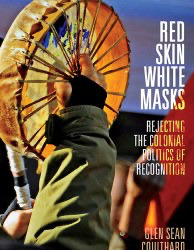
I wanted to review a powerful, revolutionary work that improves our understanding of indigenous liberation on the Left: “Red Skin, White Masks: Rejecting the Colonial Politics of Recognition” by Glen Coulthard.
Dr. Coulthard is Yellowknives Dene and an associate professor in the First Nations and Indigenous Studies Program and the Departments of Political Science at the University of British Columbia. He’s published numerous critically acclaimed texts surrounding decolonial politics and is also a co-founder of Dechinta Centre for Research and Learning.
“Red Skin, White Masks” challenges prevailing ideas of settler colonialization and Indigenous resistance by rejecting recognition as a method of organizing difference and identity in liberal politics, questioning the assumption that contemporary difference and past histories of destructive colonialism between the state and Indigenous peoples can be reconciled through a process of acknowledgment. The book provides an incredible analysis of Indigenous struggles articulated through a politics fueled not by seeking harmony and pacification, but by grounded theory, fostering a commitment to mobilize ourselves around an unflinching decolonial program.
Coulthard’s unique and sympathetic extension of Marx’s critique of capitalism, particularly through his use of the concept of ‘primitive accumulation,’ is a wonderful framing for how colonialism operates for the explicit purpose of enriching the ruling class and that this process is ongoing. The book also engages Fanon critically (as the title illustrates), explaining how colonialism made the transition from naked aggression to modern governmentality, which uses state recognition and accommodation to limit the freedoms of colonized people and their self-conception of their freedom.
All of these factors then filter into Coulthard’s critiques of liberal politics and demonstrate why indigenous liberation requires independent movements focused on the material basis of colonialism. I highly recommend this text for anyone wanting to start investigating these issues from a Marxist lens!
#indigenous liberation#decolonisation#settler colonialism#anti colonialism#colonialism#marxism#frantz fanon#bookblr#book blog#book review#native american heritage month
11 notes
·
View notes
Text
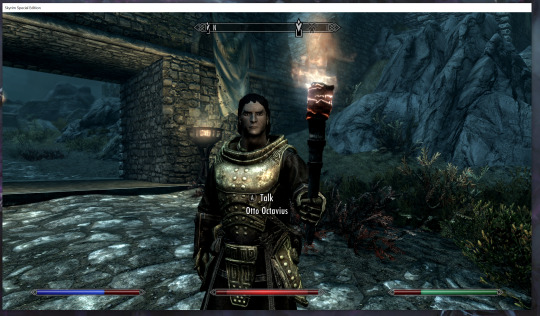
Introducing: Otto Octavius. A Battlemage who hailed from the Imperial City in Cyrodiil.
Name: Otto Octavius
Race: Imperial and Nord
Gender: Man
Age: 50
Birthplace: Imperial City, Cyrodiil
Alignment: Lawful Neutral
MBTI- INTJ
Sexuality: Sapiosexual / Pansexual
Personality: Charming, ruthless, intensely focused, highly intellectual, driven by curiosity and innovation, disregard for social conventions. Condescending, arrogant, sarcastic, proud, snobbish, stoic, high standards, elegant. When he compliments someone, he offers praise with a touch of condescension, highlighting perceived shortcomings in a sophisticated yet critical manner. Otto can be a very strict and tough teacher, but his precious students mean a great deal to him.
Likes: books, libraries, Dwemer mechanisms, research, experimentation, innovative magic and technology, teaching and mentoring, and puzzle-solving.
Dislikes: ignorance, apathy, inefficiency, mediocrity, overly superficial pursuits, deceit, disrespect, research distractions
Fears: Unforeseen consequences of experiments or studies gone wrong, especially if they endanger his students or threaten Skyrim's magical balance, falling short of his high standards or being perceived as inadequate, getting hurt from vulnerability and emotional exposure due to his guarded nature (especially in forming close personal connections), losing control over situations (such as in experiments and magical endeavors), and losing the people he loves and cares about (especially Rose).
Character Class- Enchanter
Skills- Destruction, Restoration, Alteration, Conjuration, Sneak, Enchanting
Occupation- Professor of Aetherial Physics and Dwemer Engineering at the College of Winterhold
Relationships - Mentors students Sameth and Myvrana Giladren. Collaborates with faculty and scholars including Tarakel, Aicantar, and Calcelmo. Views Calcelmo in the highest regard but also as a rival in the field of Dwemer research. He hates Marcurio. Marcurio's (bisexual disaster) playboy charismatic charm and playful banter clashes with Otto's personality.
Bio:
Otto Octavius, an Imperial Battlemage born and raised in Imperial City, Cyrodiil. He absorbed an education deeply rooted in arcane studies under the guidance of his esteemed parents. His mother, an Imperial sorceress, Maria Octavius, and his paternal grandfather, Tobias, a Nord mage, were positive parental figures in his life, while his father, Torbert, a Nord Battlemage, was abusive, negligent, and often drunk. His father used to be very harsh and strict in Otto's magic training, contrasting Tobias' and Maria's methods.
As he matured, Otto's scholarly pursuits expanded beyond norms, delving into the enigmatic realms of Dwemer Engineering and Aetherial Physics. His fascination with Dwemer constructs led him to decipher and comprehend the intricacies of Dwemer machinery, seeking to unravel the secrets behind their enigmatic technologies. His pioneering work in integrating Dwemer principles into contemporary magical and mechanical innovations earned both admiration and skepticism among magical circles, though his intense focus on knowledge often distanced him from personal connections, including love and sex. Despite acclaim in the Imperial Court, Otto felt at odds with its political climate post the Great War. Seeking enlightenment and sanctuary, he ventured to the College of Winterhold in Skyrim, embracing a role as a professor of Aetherial Physics and Dwemer Engineering.
He doesn't want to admit it, but he's a softie when it comes to his precious students and friends.
Otto doesn't fit the conventional image of a muscular Nord hero and harbors occasional insecurities about his weight and appearance.
#doc ock#doctor octopus#alfred molina#doctor octavius#skyrim#Skyrim mods#Skyrim modding#Roleplaying with AI#Doctor Otto Octavius#Otto Octavius#Elder Scrolls
4 notes
·
View notes
Text
The 7th house Neptune setup
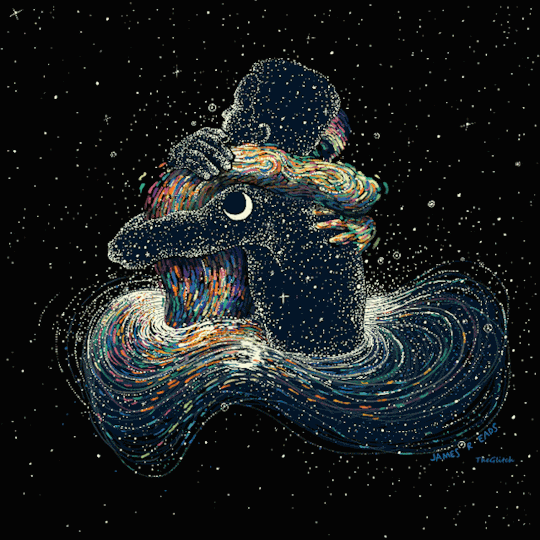
The role that connection plays in society and the world at large is evident. Everyone wants social approval, relevance, involvement. We want to be respected, highly regarded, seen as attractive, worthy of attention and interest. This is the sphere of the 7th house in the natal chart and the signs and planets involved are going to describe what kind of experience we expect and will inevitably attract. The 7th house is an angular house, powerful and potent, one of the major corner stones of the chart. The sign, the planet ruling the sign and planets on the Descendant all contribute to what our social standing is going to be like, how we are perceived by the public, how we move and orient ourselves socially and attempt to present ourselves in relationships. The 10th house and the Midheaven is usually paid more attention to than the Descendant because it points to aspirations, "public image" and personal career goals that may or may not have anything to do with what we want from personal interaction with others. The 10th house is squaring the 7th, which tells us something about the inherent friction between these two spheres. The more we seek worldly accomplishments and career goals, the less time we have to accommodate for other individuals. Work demands often put a lot of strain on the quality of partnerships and at some point one is going to have to prioritize which one is more important. The struggle is especially evident in charts where planets in the 10th/7th square each other. Since the planet in the 7th is holding the superior position through being earlier in the succession of signs, it’s often one’s own relationship with other people that motivate and push the native to ”go and do something”, but in this effort, the connection still suffers.
Professor Jordan Peterson is a great example of someone who embodies this conflict. He has Mars in the 1st, opposite Neptune in the 7th, square Saturn in the 10th (WS). A very powerful but irritating T-square is illustrated here. He’s perceived as someone who’s a straight shooter, forthright, easily irritated and annoyed in his responses, keen on promoting strength and masculinity (Mars). He likes to present himself as tough and strategic (asteroid Pallas is conjunct Mars = strategy). He likes to go to battle and can be quite provocative. He detests people who uses weakness and sensitivity to control and undermine his efforts to stand up for something that matters. These ”people” out there, are depicted as sly, manipulative, slippery, unenlightened, deceptive, trying to discredit men and their behavior (Neptune). Other people are lazy, victims of life, unmotivated, passive and pathetic, delusional and content with coercing other people into adjusting their behavior to protect their bubble reality. He’s a psychologist, which gives him right to acclaim superior knowledge of people’s motivations and internal states in a way that puts him in a position of refusing to be questioned, because ”research proves reality”… it’s true that he has Saturn to back him up on this, but once again we have to remember that the planet earlier in the succession of signs is the one in charge. In this case, Neptune in the 7th, possessing the infantile urge for omnipotence and glory through helping and rescuing people in need is motivating the effort to structure and pin down facts of how success is achieved through Saturn in the 10th. He’s big on helping other people better their lives through concrete steps and understanding of their own psychology and the structure of society at large. He has helped a lot of people who perceive him as some sort of redeemer and messiah, a person with great healing powers capable of bringing people out of misery and onto a path of success. He also displays the stern conviction of Saturn, embodying the myth of the patriarch, the father-authority that's familiar with the underpinnings of reality.

The problem with he 7th house is that it’s often projected and perceived as being ”out there”… the fascination and desire for other people, usually unspoken but felt like a powerful enchantment that belongs partly to oneself but mostly to the other, is attractive but scary at the same time. It’s something that one cannot access except through the physical in-person interaction with other people. Other people has to be a means to redemption for the person. Helpless and sorrowful victims are going to be magnetically drawn in. It can feel like one is being forced to overextend oneself in order to save people left and right, to give something up, to offer a complete sacrifice in order to devote oneself to others. Neptune in the 7th can’t be selfish with others, but this comes at the price of an accumulation of resentment that builds up over time and might spill over in demand of others coming to one’s own rescue in turn. Guilt in the 7th is a byproduct of not being able to save everyone. It also stems from feelings of being weak and ineffectual as a real partner/participator on the social arena and will therefore motivate alliances and cooperation with people who are needy and dependent. With the Mars-Neptune opposition, there’s often a lot of self loathing and beating oneself up over not being strong or tough enough to keep the suffering of other people at bay. Chaos is feared more than anything, usually in the form of other people’s messy emotions. One can’t deal with other people’s drama, weaknesses and attempts to merge and blur the lines between fantasy and reality because it’s just too much. Yet, there's an expectation that this is what should take place, more or less. It’s impossible for one person to listen to everyone, to confirm and validate all experiences, but somehow we all seek vehicles that can provide us with a glimpse of the transcendent. We all want proof of our collective soul union.
#astrology#planets in astrology#natal chart#astrology on tumblr#tumblr astrology#neptune in the 7th house#7th house neptune#7th house#the 7th house#neptunian astrology#neptunian father#neptune in the birth chart#planets#planets in houses#neptunians
49 notes
·
View notes
Text
The role he couldn’t leave behind: Eddie Redmayne and Motor Neurone Disease. A Fan Interview

Now heaped with acting awards and acclaim, Eddie Redmayne is frequently asked for insight into his craft — how does he research and transform for his roles, disappear into his characters and then shed them?
But a decade ago, as he wrestled with the unique physical complexities and the gravitas of portraying an icon, Dr. Stephen Hawking, Eddie hadn’t developed a “process” or “method” on which to lean. So he took a deep breath and, with the guidance of the Motor Neurone Disease Association, he immersed himself in the cruelties of everyday life with MND.
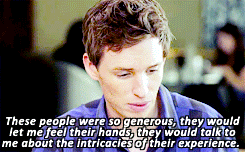

(GIFs by sirredmayne)
He was connected with clinics and invited into homes of patients unable to care for themselves, struggling to communicate, breathe — like that of the unforgettable Glenn Phillips.
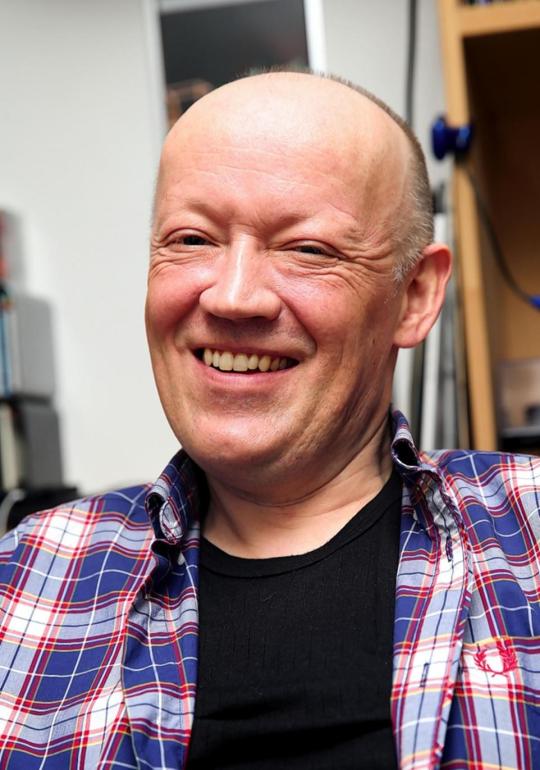
Eddie learned the nuances of the specialized healthcare and technology that simultaneously encumbers and enables. He touched flesh and muscle, cruelly atrophied.
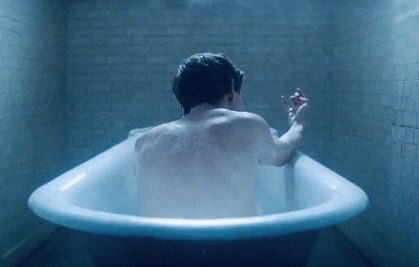

By every measure, the film, “The Theory of Everything,” was a success. Eddie’s career, already on the ascent, soared. But it wasn’t only the awards and new opportunities that had changed his life.

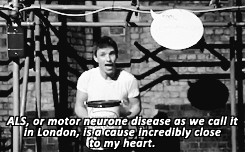
In 2015, he eagerly became a Patron of the MND Association to help heighten awareness of its global research and support of patients and families throughout the U.K. Even before the honor and in the 8 years since then, he’s been consistent in his devotion, speaking eloquently of the ravages of the disease, making appearances at events, shivering and shuddering through two Ice Bucket Challenges, lending his image and voice to public awareness projects.

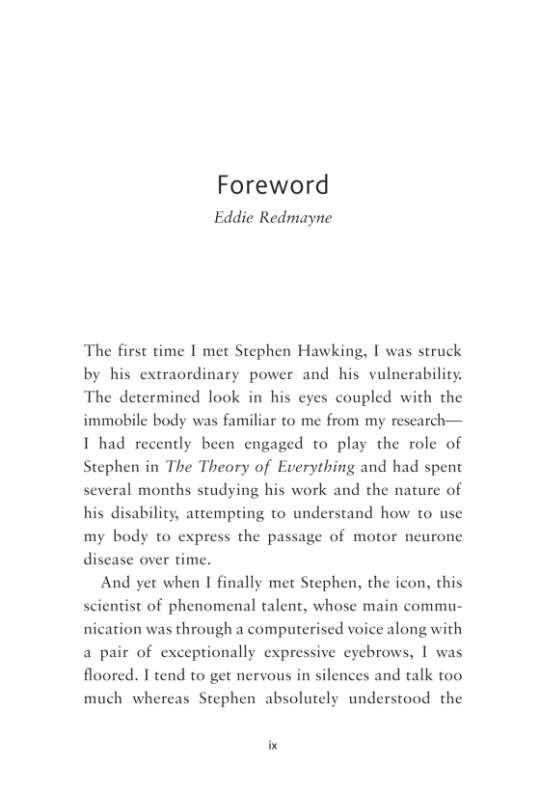
His connection to the Hawking family has endured, too. Eddie wrote the foreword to Dr. Hawking’s final book, Brief Answers to the Big Questions, and at the professor’s funeral in Cambridge in 2018 read a passage about Time from Ecclesiastes in the Old Testament:
“For everything there is a season, and a time for every matter under heaven: A time to be born, and a time to die; a time to plant, and a time to pluck up what is planted.”
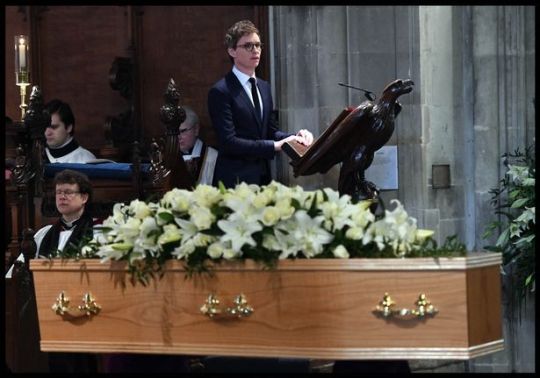
Each year, for Eddie’s birthday on Jan. 6 (just two days before Dr. Hawking’s birthday, which is always noted), he now gives his blessing to a fundraising campaign organized by fans in his honor, supporting his patronage of the MND Association.
Earlier this week, reaching out to fans, Eddie agreed to share his thoughts about his commitment to the MND Association and his gratitude for fans’ efforts.
Charlotte Aguilar: 2023 marks a decade since you first began immersing yourself in the world of MND patients and carers, and you still find yourself deeply involved with helping to raise awareness of the disease. Why was this a role you couldn’t shake?
Eddie Redmayne: Firstly, a massive thank you for organising this. It means a great deal. The preparation for playing Stephen was a long one and as well as being able to spend a proper amount of time with Jane, Stephen and their wonderful family, I was also introduced to hundreds of people living with MND. It is a disease that I saw in all its detail and brutality and those people I met and their courage had a profound, lasting impact on me.
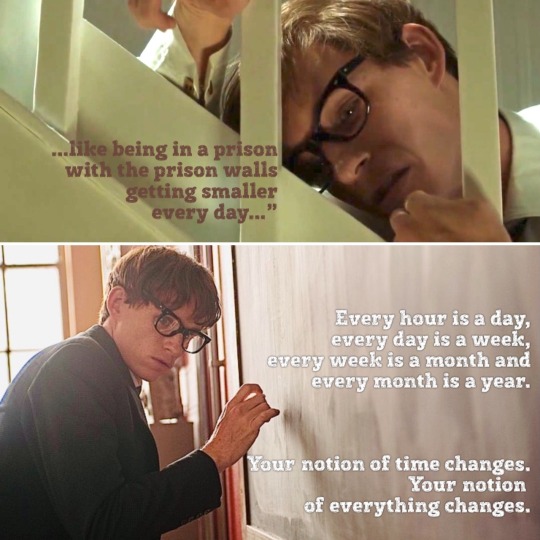
CA: Of course, your relationship with Stephen Hawking received the most attention connected to The Theory of Everything, but how were you impacted by your encounters with others in the MND community? How does what you learned from people like Glenn Phillips, whom you studied and later visited with your Oscar, stay with you in how you view life?

ER: Well, Glenn was just a brilliantly charismatic man — a passionate cinephile. He was also very open with me about the horrid tolls of the disease. He lived alone, and I remember visiting his house on a sweltering day. His doors were open to let in the air but covered with fly nets. I remember him being very concerned about keeping the fly nets in place. He reminded me that with MND you feel everything (of course), but there were parts of his body he was unable to move. So if a fly or a wasp landed on him he had no way of shooing it off. It was a specific but horrible detail of living with the disease, which of course I hadn’t preempted.
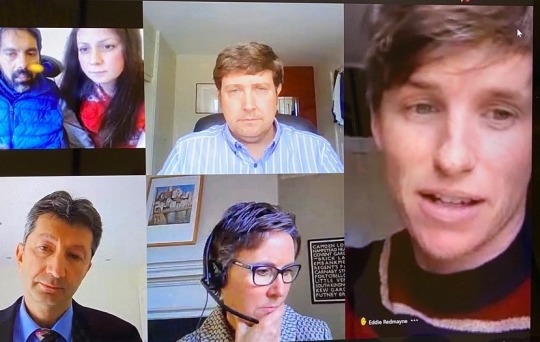
CA: During the height of the COVID pandemic, you became involved with the MND Association on a different level, helping with creating awareness among Members of Parliament about the special needs of patients. Why was that important to you?
ER: The people who run the MNDA are brilliant, and I have long offered my support to them. During the pandemic, I was astonished to hear that people living with MNDA were not automatically placed on the ‘most vulnerable’ list here in the UK. It felt important to me to hear the discussion and witness the response from the politicians when challenged on this.
CA: There have been huge bursts of attention for MND that fade — the Ice Bucket Challenges, the popularity and acclaim for The Theory of Everything, and sadly the loss of a number of well-known MND sufferers. Why is it important to keep the disease top-of-mind with the public at all times?
ER: Of course there are many extraordinary causes out there in the world vying for the attention and compassion of the public, looking for their support. Because statistically MND affects a smaller proportion of the population than some other diseases, investment in research and finding a cure can be less forthcoming. From my personal experience, having spent time with Stephen, Glenn, and a host of families, researchers, and specialists in the field, it will always be a cause that I put my support behind.
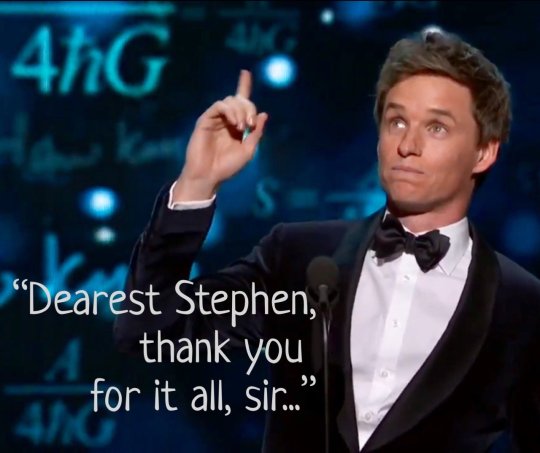
A sad postscript — a jolt of reality from June 8, 2017:

Please consider honoring Eddie’s patronage of this exceptional organization with a donation in his honor or by sharing our JustGiving page:
#eddie redmayne#2023 birthday fundraiser#mnd association#stephen hawking#glenn phillips#the theory of everything
18 notes
·
View notes
Text
satoshi tends to be pretty vague when it comes to talking about a lot of godly pokémon, wanting to keep some of the more secret stuff hush-hush for their safety, but the rest — bird trio pokémon, lugia, houou, non-godly pokémon, the like, — he often ends up accidentally flexing because he's been to so many different regions & he's seen & interacted with so many different pokémon. he quite literally knows more about pokémon than some of the most acclaimed professors, more than "the great" ookido, even, & the professor wouldn't even deny it, couldn't deny it ; as satoshi's hometown professor he has full access to satoshi's pokedex scan record & probably couldn't tell the first thing about more on the list than he'd ever care to admit, & that's the pokémon satoshi thinks to scan.
& it's not just recognizing what a pokémon is & knowing its typing & evolution line, he knows what moves they typically know, or at least can or cannot learn, knows their typical natures & how they evolve in every sense of the word, & with some of them he knows details one would usually have to check the pokedex for because he's been checking different national pokedexes for info on pokémon he already knows for years because sometimes the info is different depending on the region, but sometimes the info repeats & satoshi ends up memorizing it.
satoshi also knows a lot about ultra beasts. he worked with the aether foundation & professor burnet a lot in helping classify a large number of discoveries & helped gather information on them through his battles with ones that escaped the ultra dimension, these battles mostly contributing to identifying the ubs' skillsets & moves, if they could be identified as such. he knows their names & their typings, knows their strengths & weaknesses, has a fairly good sense for what their natures are typically like. he might not be able to explain things quite as scientifically as the foundation's researchers or the professors, but he can be considered one of the most knowledgeable people there is when it comes to ultra beasts, if only because of exposure.
9 notes
·
View notes
Text

The question of how to lead a happy and meaningful life has been at the heart of philosophical debate since time immemorial. Today, however, these questions seem to be addressed not by philosophers but self-help gurus, who frantically champion the individual's quest for self-expression and self-realization; the desire to become authentic.
Against these new age sophistries, How to Stop Living and Start Worrying tackles the question of 'how to live' by forcing us to explore our troubling relationship with death. For Critchley, philosophy begins with the question of finitude and with his understanding of a key classical theme - that to philosophize is to learn how to die. Learning how to accept both our own and others' mortality as a part of life also raises the question of how to love. Critchley argues that the act of love requires us to give up something of ourselves, to lose control so as to be open to the demands of love. We will never be equal to this demand and so we are brought face to face with our own limitations - one form of which is what Critchley calls our 'originary inauthenticity'. By scrutinizing the very nature of humour, Critchley explores what we need to laugh at ourselves and presents the need to confront the inescapable ridiculousness of life.
Reflecting on the work of over 20 years, this book provides a unique, witty and erudite introduction to the thought of Simon Critchley. It includes a revealing biographical conversation with Critchley and a fascinating debate with the critically acclaimed novelist Tom McCarthy about the nature of authenticity. Taken together the conversations give an intimate portrait of one of the most lucid, provocative and engaging philosophers writing today.
Simon Critchley is Hans Jonas Professor of Philosophy at the New School for Social Research in New York City. He studied philosophy at the University of Essex, where he also earned his doctorate, and later joined the faculty. He also received a masters in Philosophy from the University of Nice. Among other activities, he has served as Directeur de Programme at the College International de Philosophie in Paris (1998-2004), has been a fellow at the Humboldt Foundation (1997-1999), and has taught as a visiting professor at many institutes and universities. He is the author of 17 books, some of which have been widely translated.
youtube
youtube
youtube
2 notes
·
View notes
Text
Discover The Poignant Beauty of First Love In André Aciman's Call Me By Your Name

Call Me By Your Name is a coming-of-age novel written by André Aciman, which was published in 2007. The story is set in the summer of 1983, in a small village in northern Italy. The book has received critical acclaim for its beautiful prose, evocative descriptions of the Italian countryside, and its portrayal of first love.
The novel is told from the perspective of 17-year-old Elio, the son of an archaeology professor. Elio is an introspective and sensitive young man, who spends his days reading, playing the piano, and exploring the beautiful countryside around his family's villa. Elio's life changes when his father's research assistant, Oliver, comes to stay with them for the summer. Oliver is a charming and confident young man who is working on his doctorate in philosophy. Elio is immediately drawn to him, and the two begin a tentative friendship that gradually deepens into a passionate romance.
The novel is a beautifully written exploration of the complexities of first love. Aciman captures the intense emotions and uncertainties that Elio experiences as he falls in love with Oliver. The novel is also a poignant meditation on the nature of desire, and how it can be both exhilarating and terrifying. Elio struggles with his feelings for Oliver, not knowing whether they are reciprocated or if he is just a passing fancy for Oliver.
The novel is also a vivid portrayal of the Italian countryside, with its sun-drenched hills, olive groves, and crystal-clear lakes. Aciman's prose is lyrical and evocative, and he captures the sensory details of the landscape with a poet's eye. The novel is a sensory feast, and readers will be transported to the Italian countryside as they read.
Call Me By Your Name is a powerful and emotionally resonant novel that will stay with readers long after they have finished it. Aciman's writing is beautiful and evocative, and his portrayal of first love is both poignant and complex. The novel is a testament to the power of love, and how it can transform and enrich our lives. Highly recommended for anyone looking for a beautifully written and emotionally resonant novel.
#lgbtqiia+#lgbt representation#lgbt books#lgbt pride#lgbtpeople#coming of age#coming of age stories#call me by your name#timothee chalamet#andre aciman#gay mlm#mlm love#mlm books
5 notes
·
View notes